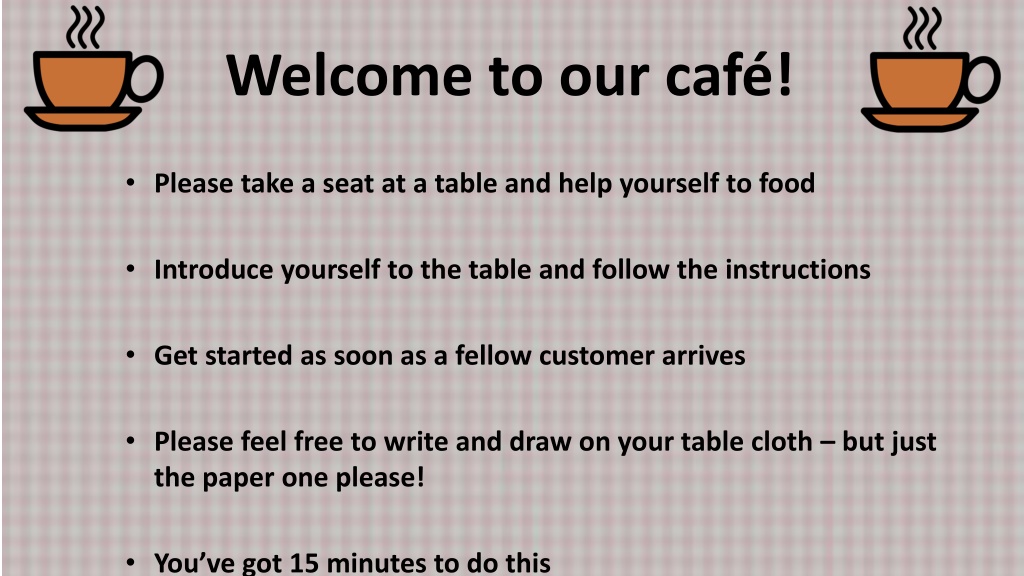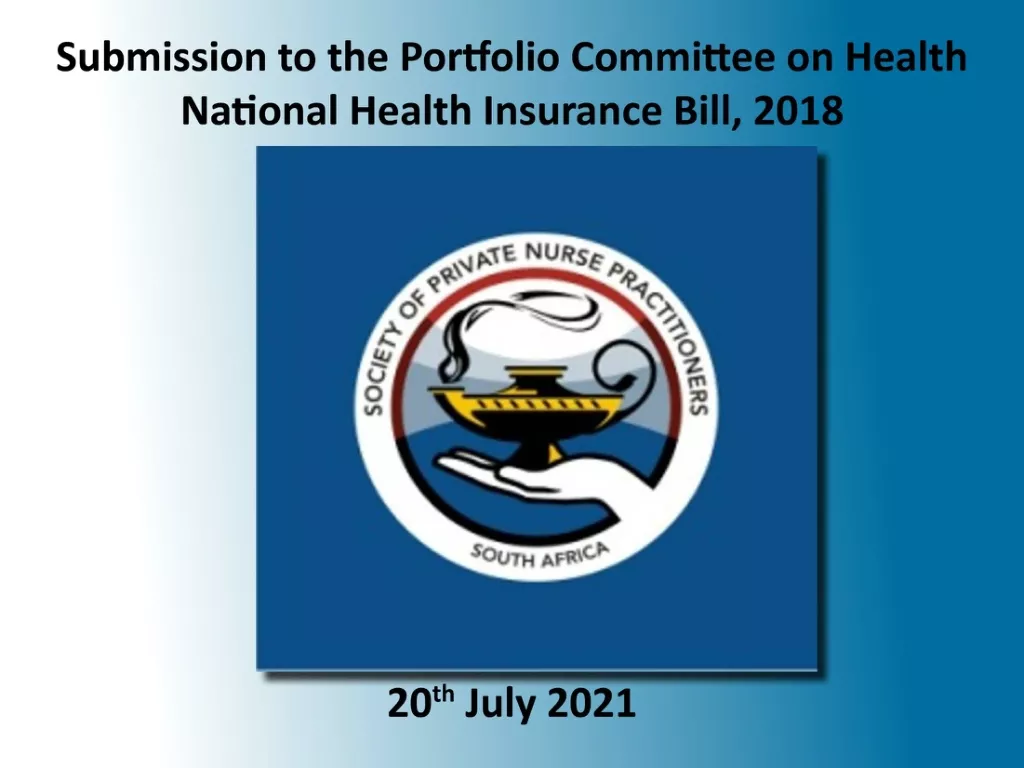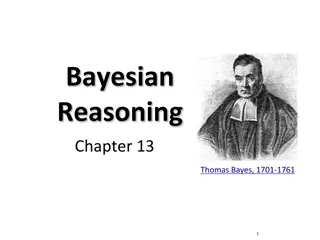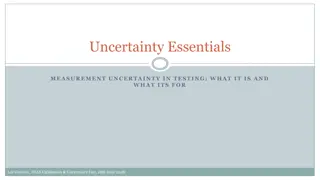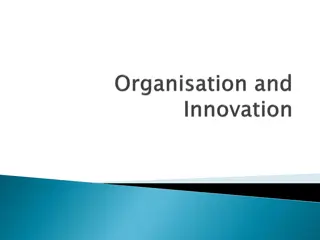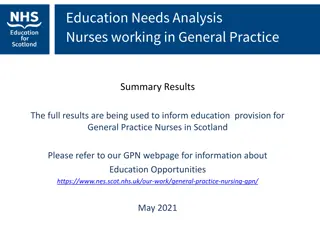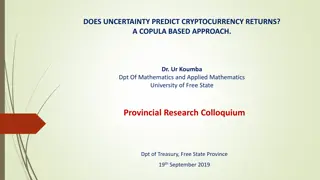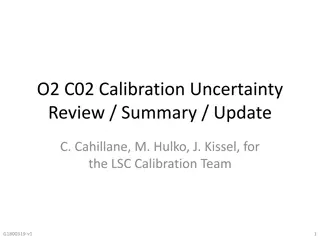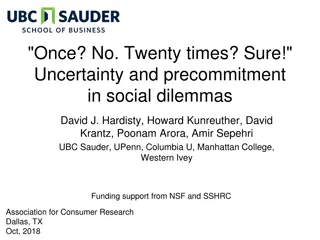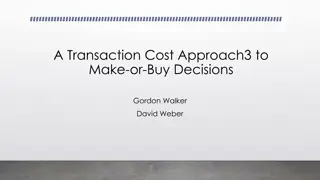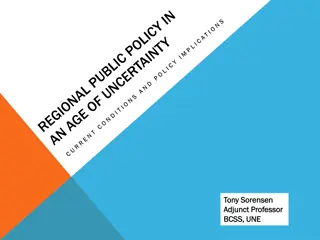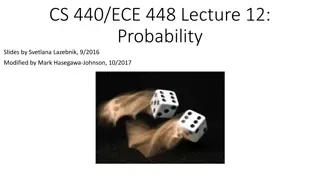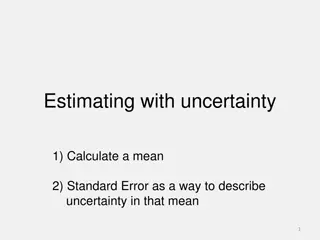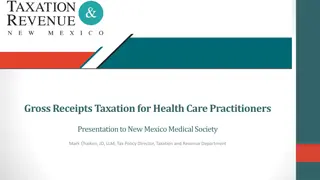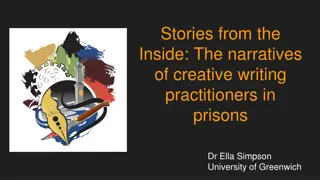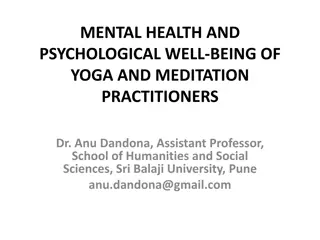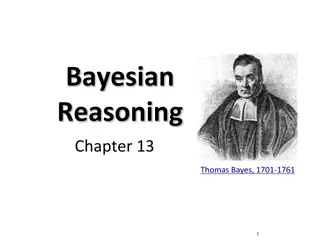Strategies Used by General Practitioners to Manage Uncertainty in Practice
General Practitioners (GPs) encounter uncertainty in their practice and utilize various strategies to address it. These strategies include safety netting, seeking advice from colleagues, sharing uncertainty with patients, review/follow-up processes, investigations, building rapport, and more. Colleagues also play a role in managing uncertainty by arranging follow-ups, over-referring, or seeking second opinions. GPs assist trainees by discussing risks, outcomes, challenging decisions, and acknowledging uncertainty. The survey of GPs and trainees sheds light on experiences of uncertainty and the effectiveness of different strategies employed.
Download Presentation

Please find below an Image/Link to download the presentation.
The content on the website is provided AS IS for your information and personal use only. It may not be sold, licensed, or shared on other websites without obtaining consent from the author. Download presentation by click this link. If you encounter any issues during the download, it is possible that the publisher has removed the file from their server.
E N D
Presentation Transcript
Welcome to our caf! Please take a seat at a table and help yourself to food Introduce yourself to the table and follow the instructions Get started as soon as a fellow customer arrives Please feel free to write and draw on your table cloth but just the paper one please! You ve got 15 minutes to do this
Managing uncertainty in general practice March 2015 Dr Janet Rutherford Dr Helen Edwards Dr Catriona Davis
Our survey 27 GPs/GP trainers 17 trainees Own experience of uncertainty, strategies used to manage it and how they help others manage it
GPs Your experience of uncertainty When you first started in general practice did you find uncertainty a challenge? If so do you still? Yes Less so/occasionally No More Not sure 9 9 3 1 Yes No Not sure 21 3 1 1
GPs Your strategies Safety netting Seeking advice from colleagues Sharing uncertainty with patient Review/follow up Investigations Rapport
GPs Your strategies good rapport with patients honesty when I am not sure Innate personality trait Being obsessional Common things are common Accepting that GP is different to hospital medicine and making a decision about whether has to be done that day or can be left.
GPs Colleagues strategies some colleagues will arrange sooner follow ups or over refer or investigate rather than take a risk follow up, investigation, consensus, second opinion I wonder if some people 'bury their heads' and end up becoming over protective or disillusioned as a result
GPs How have you helped trainees? Using time Discussion about risk Talking through outcomes/challenging decisions Using their experience/ developing confidence Discussing own approach/experience Debriefs/supervision Acknowledging uncertainty Safety-netting
GPs How have you helped trainees? Primarily I want them to feel safe and confident in the decisions they make ..reassuring them that we are in the same boat.. Allow safe mistake Get them to talk through 2 different paths for the same case time is a diagnostic tool - use it Gentle "challenge" about their decision
GPs How does this make you feel? Always happy to help. Frustrating when a trainee doesn t develop these skills Better 7 I think it s a pity trainees seem to be increasingly risk-averse No change 2 Increases anxiety 4 I think sometimes trainees are less aware of the possible uncertainties as they have seen fewer conditions so they are may see me as being obsessive
GPs Has helping trainees changed your own practice? Yes 5 No as I have been doing the job a long time No 9 Probably, I'm sure that training other doctors has had a big effect on my own professional development, everyone should do it! Probably 3 Not really 4
GPs Top tips for a new GP? Ensure accessibility/continuity Discuss with colleagues Share uncertainty with patient Use time Good communication/rapport Leave work at work Be realistic
Top tips for a new GP? Don t expect yourself to be perfect With confidence/experience you will be more confident .never go home with uncertainty . don t think too much about minutiae - common things really are common.. Recognise this is general practice. Enjoy the ride or get off the rollercoaster
Trainees Strategies Discussion with trainer/colleagues Follow up/review Reading around topic Safety netting
Trainees Trainer input Discuss cases Debriefs Weekly slots Random and specific cases Being approachable Share experience Regular teaching on identified needs ..it often seems like our trainers know everything and are never uncertain, that can make me feel very inadequate VTS session
Trainees Top tips for a new ST1 trainee? Shared surgeries Insist on debriefs Use time Safety netting Discuss with colleagues Accept/be honest about uncertainty Share uncertainty with patient Follow up
What does this mean for training? Sharing uncertainty with patient and trainee Discussion with colleagues debriefs, accessibility Safety netting Use time Communication shared surgeries
Other thoughts Discussing previous experience trainer and trainee Assessing level of risk and different outcomes The safe mistake ?
Group One Challenges faced as Trainer Staying positive Recognising that integral to general practice Common sense, a skill often neglected at medical school/during recruitment ?too much, or too little, knowledge Differences to hospital, pts go home . Trainees tend to experience fragmented patient journey during their hospital posts
Group One Challenges continued Encourage faith in own judgement Trying to decide when patient ready to fly Career pathways Referrals/follow up Gauging level appropriate confidence Work environment/support
Group Two Challenges Faced as Trainer How to manage own uncertainty Minimising rosk Acute work Guideline focussed as opposed to gut instincy Hospital versus general practice Encourage trainees to talk to colleagues rather than refer
Group Two Challenges continued Safetynetting Recognising educational need as opposed to uncertainty Recognising over-anxiety in a good trainee Personality types Trusting trainee s clinical skills trainer taking the risk on Ability to express risk to pt Probabilities versus possibilities
Group One Potential Solutions Explore their thinking rather than telling them Encourage them to think through differentials before asking Skills for sharing uncertainty with patient Joint surgeries Videos - ?stop every minute Debriefs, permission to ask at any time Recognising own limitations Early tutorial on subject
Group One Potential Solutions continued Build up bank of own cases to discuss Probabilities/pattern recognition Encourage trainees to follow up pts ICE No blame culture Practice meetings/coffee Ensure confident dealing with emergencies so can recognise when immediate action not needed
Group Two Potential Solutions Dedicated early session on it Specific consultation skills eg summarising, how to share uncertainty Trianee debrief the trainer Rule of three Videoing, ?stopping every minute Encourage independence (?avoid too much debrief) and resilience
Group Two Potential Solutions continued Sharing complaints Team culture of openness What comprises the gut feeling Reflecting on own practice Using time Build up bank of cases to discuss Appropriate accessibility
Aggravating factors in uncertainty the doctor The impostor syndrome the risk of being found out Personality some personalities will find uncertainty more difficult The black hole I don t know what I don t know Low self-esteem in the doctor The doctor s need to help Doctors beliefs about societal obligations to protect the vulnerable
The patient A dreaded outcome e.g. death, a complaint Insoluble problems An uncertain degree of risk in the decision-making process Somatisation Natural variations in the disease process Dependency by the patient on the medical model resulting in the patient expecting that the doctor always will know the answer
The consultation A problem not recognised by pattern recognition Choices in management Doctor-centred consulting resulting in difficulty with sharing uncertainty with the patient and the ability to encourage or even receive feedback from the patient The doctor s and the patient s personal boundaries Medical decision making requires combinatorial analysis to comprehend patients uniqueness and avoid harmful, unnecessary trial and error
Society Socially mediated sense of threat eg mass media or lobby groups
Developing strategies the doctor Information systems and decision support Emotional intelligence Exploring personal resistance to risk-taking Reality-checking what is really likely? Narrative based medicine Developing the doctor s personal self-awareness Building personal resilience emotional support, healthy living Deconstructing the pain and guilt Sharing uncertainty patient, colleagues Support mentoring/co-mentoring
In the consultation The disease-illness model Negotiation in decision-making risk management Sharing responsibility for decision-making Ideas, concerns and expectations Patient-centred feelings-based communication
Summary points Accept that uncertainty is a normal part of general practice Good doctor-patient relationship is vital Involve patient in decision-making Discuss probabilities including degree of uncertainty Consider each patient as an individual Use external evidence Consider use of checklist Maintain good records Be aware of your feeling and acknowledge them Apply reflective practice Peer group discussions Adapted from O Riordan et al (2011)
References and resources Marinker M & PeckhamPJ (eds) Clinical Futures London: BMJ Books, 1998 RCGP curriculum (2010) http://www.gmc- uk.org/1_Being_a_GP_May_2014.pdf_56885557.pdf O Riordan et al (2011) Dealing with uncertainty in general practice: an essential skill for the general practitioner Pennine VTS http://www.pennine-gp-training.co.uk/managing- uncertainty.pdf
